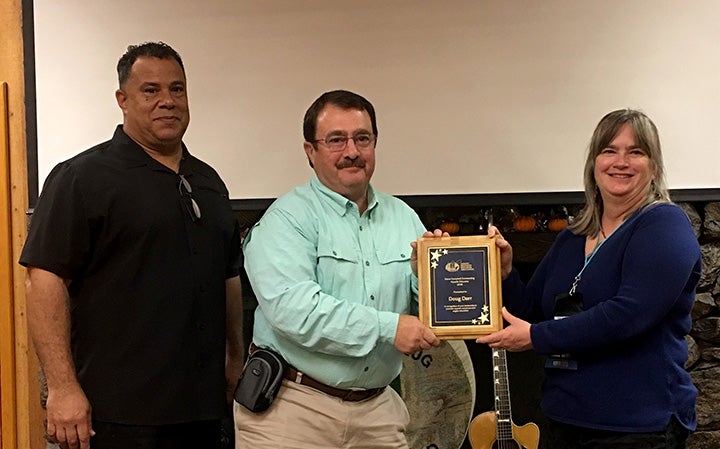Doug Darr, Aquatic Education Coordinator for the Alabama Division of Wildlife and Freshwater Fisheries (WFF), was recently awarded the Steve Campbell Outstanding Aquatic Educator of the Year Award during the Aquatic Resources Education Association’s (AREA) biennial conference in Lake Tahoe, Calif.
The award recognizes an AREA member’s effort to increase public appreciation for the values of aquatic resources. The award winner is also seen as a leader in providing and promoting angler education and fishing opportunities to diverse audiences in a fun, energetic and enthusiastic manner as was exemplified by Steve Campbell, who worked for the Texas Parks and Wildlife Department.
Darr has been WFF Aquatic Education Coordinator since 1997 and a member of AREA since 2000. Since the fall of 2001, he has helped 60,513 people learn how to fish or learn about the aquatic environment. He has also given 1,816 public talks to promote fishing in Alabama. Most of Darr’s presentations feature hands-on learning experiences in the form of casting classes, fishing classes and interactive talks about the importance of healthy aquatic environments.
“I’ve taught classes of anglers from age four to 83 how to fish,” Darr said. “Each class is both rewarding and a challenge. It’s a challenge because not everyone will catch a fish, but the goal is to instill confidence and an enthusiasm for fishing. It’s also rewarding when participants that did not catch a fish during the class still find the experience helpful. When students from schools like St. James in Montgomery, Ala., write thank you letters, they give me the feedback that helps renew my motivation.”
Last year, Darr conducted 81 fishing classes for 2,217 participants and 49 casting classes for 3,309 students. Many of those classes took place as part of various school physical education programs. Additionally, he instructed 35 teachers on how to teach fishing and gave nine talks about the importance of healthy aquatic environments to 343 students.
As the state’s Aquatic Education Coordinator, Darr oversees the WFF Community Fishing Program, which provides quality fishing opportunities for many communities and groups that do not have access to such experiences.
“Prior to 2008, many municipalities in Alabama held fishing events, but during the last recession money to provide fish for these events was not a priority,” Darr said. “The number of public fishing events has remained low since then. As the economy continues growing, my hope is that municipalities will see the value in managing their waters for fishing.”
During most of the 20th Century, youth learned to fish from family members, but in the past 40 years that mentoring has shifted to someone outside the family.
“With the cultural shift away from outdoor activities like fishing, organizations such as conservation groups, schools and state wildlife agencies must fill the gap to help people learn how to fish,” Darr said.
WFF does not receive funding from Alabama’s General Fund. WFF is funded directly by hunters and anglers through the purchase of hunting and fishing licenses. When a hunting or fishing license is purchased, that money is federally matched nearly three-to-one through Pittman-Robertson Act and Sport Fish Restoration Act funding. Additionally, funding comes from excise taxes on specific outdoors equipment. These funds are used to manage fish and wildlife populations and help support programs such as WFF’s Community Fishing Program.
For more information about classes on fishing, casting or the aquatic environment, contact Doug Darr through the WFF Fisheries Section at 334-242-3471, or visit www.outdooralabama.com.
AREA is dedicated to promoting fisheries and aquatic habitats that enhance the quality of life for current and future generations through sound educational practices, stewardship, and the responsible use of those resources. Learn more at www.areanet.org.
The Alabama Department of Conservation and Natural Resources promotes wise stewardship, management and enjoyment of Alabama’s natural resources through four divisions: Marine Resources, State Lands, State Parks, and Wildlife and Freshwater Fisheries. To learn more about ADCNR, visit www.outdooralabama.com.
###






